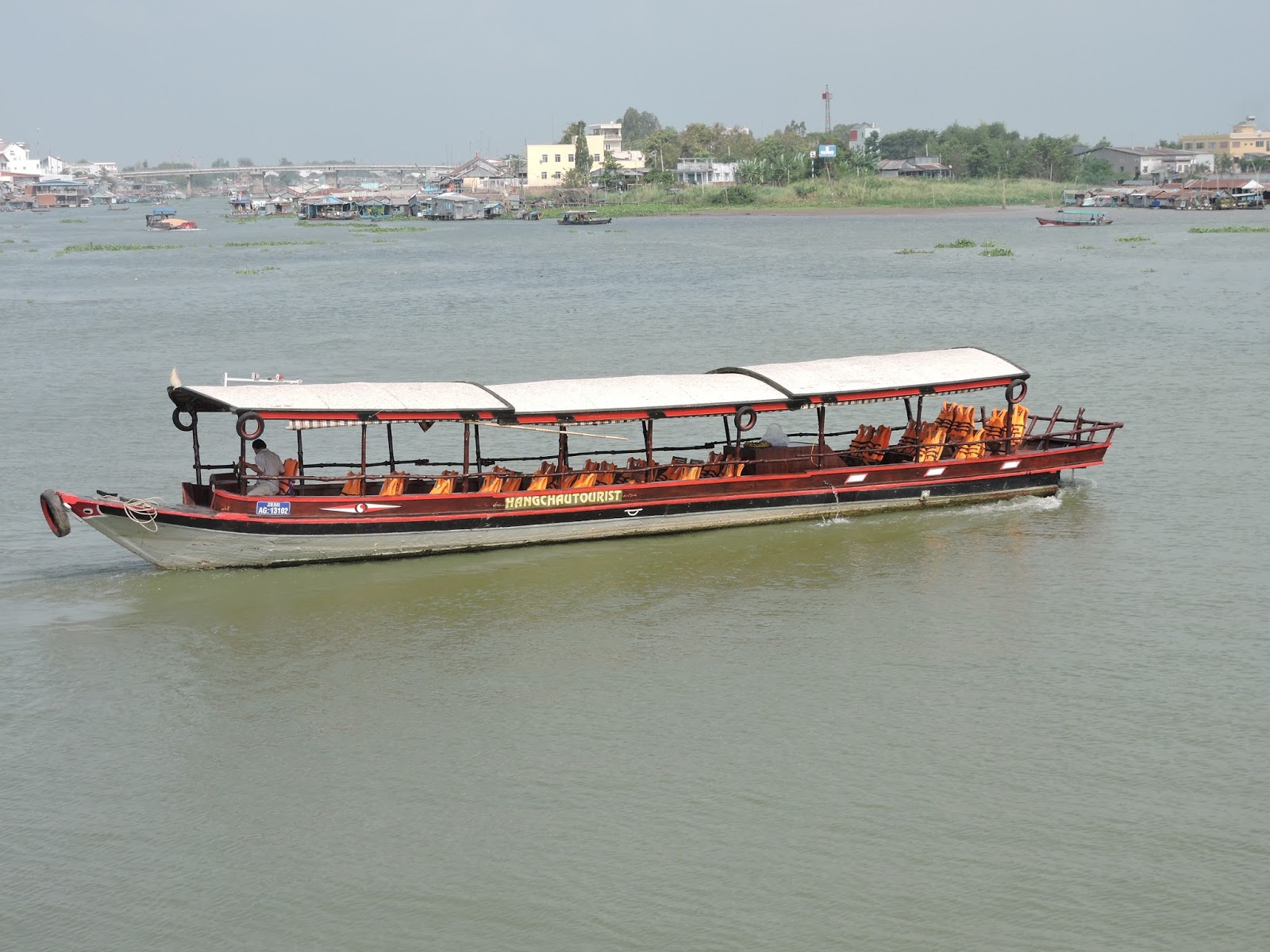Day 12 February 17 Cruising: Border Crossing–Chau Doc, Vietnam
Enjoy the morning at leisure as you cross the border into Vietnam.
Sunrise from our cabin on the Mekong.
We anchored overnight just on the border of Cambodia and Vietnam. When we went to breakfast the servers pointed out the border.
Phiem has made sure everyone's paperwork is in order and it is taken by motorboat to the shore for inspection.
We relax on board as we cruise into Vietnam. It is much greener and gets more interesting than Cambodia was along the Mekong.
Because our vessel is small it is able to cruise down a canal that wouldn't be available to the larger river boards.
Châu Đốc is a city in An Giang Province, in the Mekong Delta region of Vietnam. As of 2013, the city had a population of 157,298, and cover an area of 105.29 km².
The city is located by the Hâu River (a branch of the Mekong River flowing through Vietnamese territory) and Vinh Te canal. Châu Đốc is situated 250 km west of Ho Chi Minh City. It takes about six hours to travel by bus from Hồ Chí Minh City.
Our sampan is approaching.
Getting ready to board.
Everyone is getting prepared for New year's, cleaning and painting their homes. Marigolds are everywhere.
Tet (new year) holidays are days of relaxation, happiness and joy. And similar to pine trees for Christmas holiday in the West, Vietnamese use many kinds of flowers and plants to decorate their homes. Chrysanths, marigold, Mao Ga flower, paperwhite flower, lavender, to name a few are used.
Along the way you will see scenes of local life, including traditional Vietnamese floating markets and villages.
Some incredible sights on our way.
These ducks can't fly and seemly are so dumb they forget where they live!
The guide had us thinking these were unique pink ducks, not so, they are dyed so the farmer can identify his.
Graves in a rice field. Ancestors continue to help and protect the family and their graves are usually situated close to the family home, either in a cemetery at the bottom of the garden, in a rice paddy or field. We saw many graves in the middle of rice paddies as we travelled the Mekong.
We disembark in Chau Doc, this is a very poor village, the idea is to show us what life is like here.
Vietnamese, Champa and Khmer live together in harmony. The three main religions in this region are Mahayana Buddhism(Kinh/Vietnamese, Hoa/Chinese); Theravada Buddhism (Khmer/Cambodian), and Sunni Islam (Cham). The total population is around 120,000 with a vast majority of Kinh (Viet) and some Khmer Krom.
This little guy is so excited because one of our group gave him a to car.
The residents buy waste and then recycle it. There are a number of floating houses (the floats are empty metal drums) which provide a convenient way for families to raise fish underneath.
The temple built in 1820 was first made of bamboo and leaves, then being reconstructed several times until 1972. Having 4 square roofs, roofed with blue pile-shaped tiles featuring the Chinese character "Quoc", it is a beautiful and solemn architectural work.
Popular tales regarding the discovery of the goddess begin with either the statue appearing on the peak of an island as the water level in the Mekong Delta recedes, either because she was placed there many centuries before, or because she grew naturally from the stone. Some tales state that the people of the region simply built a temple around where they discovered her. Another popular account places her higher up the mountain. In this version, she possesses a young village girl, announces her identity and tells the people of the village where she is located on the summit of Sam Mountain. The goddess wished to be venerated, so forty of the villages strongest men tried to carry her down the mountain, but found her to be far too heavy to carry. The Lady then reappeared to tell the villagers that only nine virgin girls would be able to carry her. They proceeded until arriving at the base of the hill where the Lady of the Realm decided she was meant to remain, and she became heavy once more. This is where her temple stands today.
You are not supposed to take pictures of the goddess but we did manage.
Because it is New Year's everyone is making offerings to the gods for the upcoming year of the goat.
A very unusual offering is a whole roasted pig.
Children will be children.
You will also stop to see a LOCAL MARKET, where shop owners are selling dried goods. (Breakfast, Lunch, Dinner)
Ah, the smells of the local market, check out the fish for sale.
Sorry, but this smelled vile.
Walking back to our sampan.
Back on board we are served some fruit.
Learn about some of the different species of fish living in the Mekong at a LOCAL FISH FARM.
The fish are raised in ingeniously designed underwater cages kept underneath peoples’ floating homes on the river. The homes are kept afloat by a combination of empty wooden drums and wooden stakes.

































































.JPG)






That was a very interesting trip. The historical, religious, cultural and social elemrnts all add up to a fascinating trip. I like Vietnamese hat. Wherever I see that, it always reminds me of Vietnam.
ReplyDeleteWhat an interesting post Jackie. You've taken some absolutely fantastic photos. All the best on your travels.
ReplyDeleteAstonishing post. Astonishing pictures.
ReplyDeleteA fascinating post, Jackie!
ReplyDeleteWe will definitely cruise the Mekong on our next trip to Vietnam - these pics are great :-)
ReplyDelete